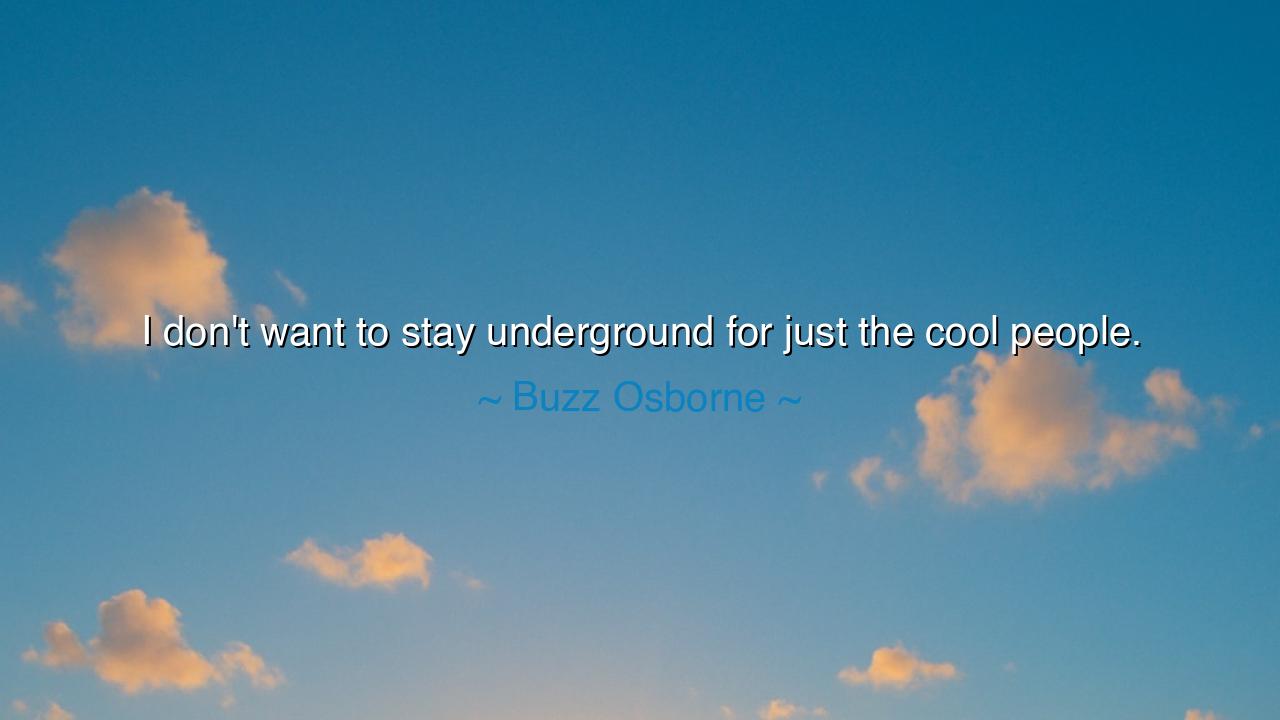
I don't want to stay underground for just the cool people.






"I don't want to stay underground for just the cool people." These words spoken by Buzz Osborne, a renowned figure in the music world, convey a profound message about artistic integrity, identity, and the desire to create in a space that is not confined to the expectations of any select group, whether they are considered "cool" or not. Osborne’s declaration speaks to the tension between the underground culture of rebellion and authenticity and the lure of mainstream recognition. To remain underground is to avoid the pressures of popularity and commercial success, but Osborne challenges this notion by rejecting the idea of being confined to a niche audience—no matter how elite or exclusive it might seem. His desire is to break free from the constraints of what others expect from him as an artist and to reach a broader audience, all while staying true to his own voice and vision.
In the ancient world, artists and philosophers often faced the tension between the desire for recognition and the commitment to authenticity. Socrates, for example, lived in a society where philosophers were often seen as eccentric or even dangerous, but he never sought approval from the elite. Instead, he sought to engage with people from all walks of life, challenging them to question and reflect on their beliefs. Socrates did not care about staying in the good graces of the powerful or the "cool" people of his time; he sought the truth, even if it meant alienating the influential members of Athenian society. Similarly, Osborne’s quote speaks to an artist’s desire to reach a universal audience—to touch people from all backgrounds, not just those who adhere to the current trends or underground movements.
The desire to break boundaries and reach beyond a select group is not a new sentiment. In Rome, Virgil, one of the greatest poets of antiquity, wrote his epic, the Aeneid, with the intention of preserving the legacy of Rome’s founding while making it accessible to future generations. Virgil did not write solely for the Roman elite, but for a wider audience, ensuring that his works would speak to the heart of the Roman identity, instilling pride in citizens from all classes. Virgil’s vision was not restricted by any one faction of society but was driven by a desire to leave a lasting impact on the broader Roman populace. In this way, Osborne’s desire to reach a broader audience aligns with the ancient tradition of cultural contribution that transcends the confines of niche popularity.
Consider also the story of Ludwig van Beethoven, a composer who lived in an era when music was largely performed for aristocratic audiences. Beethoven, however, sought to elevate music to a level that was not confined to the courtly elite but could resonate with people of all walks of life. Even as his hearing deteriorated, Beethoven refused to compromise his artistic vision, pushing his compositions to unprecedented emotional and intellectual depths. He did not desire to compose for just the "cool" aristocrats of his time but aimed to create a body of work that could connect with the common people and speak to the universal human condition. Like Beethoven, Osborne wants his art to transcend the boundaries of an exclusive underground world, reaching people who may not initially identify with the scene but are still capable of connecting with the music on a deeper level.
In the context of the modern world, Osborne’s refusal to remain underground for the "cool people" can be seen as a challenge to the idea of artistic elitism—the notion that art must be confined to the tastes of a select group in order to be considered authentic. The underground culture, which often prides itself on its exclusivity and rejection of the mainstream, can sometimes create its own set of limiting standards. Osborne rejects this narrow view by stating that art should be for everyone—it should be about universal resonance rather than catering to a group of people who define their own relevance through the rejection of the masses. True art, he believes, is not about appealing to an elite few but about touching the hearts and minds of a broad and diverse audience.
The lesson that we can draw from Osborne’s statement is the importance of universal connection and authenticity in all forms of self-expression. In our own lives, we are often tempted to define ourselves by the groups we belong to or the identities we adopt—whether in our careers, social circles, or artistic endeavors. However, the true measure of impact and value lies not in staying confined to the niches we carve out for ourselves but in how we reach others, how we contribute to the world in a way that transcends the limitations of exclusive identities. Whether as artists, thinkers, or creators, we should seek to touch and move people from all walks of life, not just those who share our exact tastes or ideologies.
In our own lives, let us embrace Osborne’s call to reach beyond the narrow confines of "cool" or "elite" circles. Instead of allowing our identities to be defined by what we reject, let us focus on what we can offer to the wider world, creating connections that go beyond the limited scope of exclusivity. Whether through art, business, or relationships, true fulfillment comes not from hiding away or remaining secluded but from sharing our work and our true selves with the world. Just as Osborne refuses to be confined to the underground, so too can we all seek to live lives that are open, expansive, and capable of creating impact on a much larger scale.






AAdministratorAdministrator
Welcome, honored guests. Please leave a comment, we will respond soon